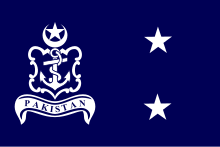Naval Intelligence (Pakistan)
In today's world, Naval Intelligence (Pakistan) is a topic that has become increasingly relevant and essential in contemporary society. Whether it is Naval Intelligence (Pakistan) as an individual, an important date or a current topic, its importance and impact can be seen in all aspects of everyday life. With the advancement of technology and globalization, Naval Intelligence (Pakistan) has begun to play a crucial role in the way we relate, work and get along in the modern world. In this article, we will explore in detail the importance and influence of Naval Intelligence (Pakistan) in today's society, as well as the implications it has on our daily lives.
| نظامتِ عمومیِ برائے بحری سراغرسانی | |
 | |
| Agency overview | |
|---|---|
| Formed | 14 August 1947 |
| Type | Covert Intelligence |
| Jurisdiction | Pakistan Navy |
| Headquarters | Navy NHQ in Islamabad |
| Employees | Classified |
| Annual budget | Classified |
| Agency executive |
|
| Parent department | Ministry of Defense (Government of Pakistan) |
| Parent agency | Pakistan Navy |
| Child agency |
|
The Directorate-General for the Naval Intelligence (reporting name: DGNI), unofficially as Naval Intelligence or Nav Intel, (Urdu: نظامتِ عمومیِ برائے بحری سراغرسانی) is the military intelligence agency within the Pakistan Navy tasked with primarily the Navy's modernization efforts and advancing knowledge of protecting Nation's interests from seaborne attacks.: 150–154
The Naval Intelligence is tasked with primary objective of providing critical information to the Pakistani military's combat branches ranging from gather advanced knowledge on threats of terrorism and briefing on potential targets to the Marines Recon teams and the Special Service Group Navy (SSGN).: 65
References
- ^ USA, IBP (2009). Pakistan Intelligence, Security Activities and Operations Handbook. Lulu.com. ISBN 9781438737218. Retrieved 4 August 2018.
- ^ "Pakistan Navy launches probe". The Nation. 31 August 2013. Retrieved 4 August 2018.
- ^ Anwar, Muhammad; Baig, Ebad (2012). Pakistan: Time for Change. AuthorHouse. ISBN 9781477250303.